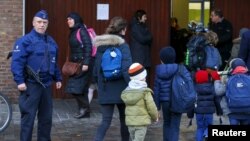Schools that install a lot of indoor cameras may not be improving security while in fact making children feel less safe, a U.S. study suggests.
Surveys of more than 54,000 middle and high school students found that the presence of security officers and outdoor cameras made kids feel safer, according to the report published in the Journal of Adolescent Health. But cameras indoors made them feel more vulnerable.
"We've been focusing on physical safety in our schools, but we also need to consider emotional safety," said the study's lead author, Sarah Lindstrom Johnson of the School of Social and Family Dynamics at Arizona State University in Tempe. "If we're not careful in our efforts to improve physical security of our schools, there may be an impact on students' emotional safety."
Lindstrom Johnson's study focused on 98 middle and high schools in Maryland.
Along with surveying the students, the researchers checked out the security measures at the schools, counting the numbers of cameras inside and outside and noting the presence of security officers.
When they analyzed the data, the researchers found, the higher the number of cameras in a school, the less safe and supported the kids said they felt.
Felt like spying
While cameras inside the school might have been installed for safety reasons, students had the sense they were being spied upon, Lindstrom Johnson said. "And the administrators did see an additional benefit to these cameras in allowing them to see who might be committing vandalism, cutting class and things like that," she added.
Given the way that students perceive indoor cameras, "administrators and school districts need to be thoughtful about why and where they are putting cameras," she said.
The study also found that indoor cameras were less likely to make black students feel unsafe, Lindstrom Johnson said. "We think the reason may be mimicking more the national movement of black youth recording interactions," she said.
Nonetheless, Lindstrom Johnson added, with no proof "that these measures deter extreme school shootings, even peer to peer, a community's money might be better spent providing emotional support to students." There is evidence that support of this kind can reduce violence, she noted.
"[The new findings show] that more security does not necessarily mean that students feel safer," said Shannon Bennett, an assistant professor of adolescent psychology and psychiatry and clinical director of the youth anxiety center at NewYork-Presbyterian/Weill Cornell Medical Center.
"There needs to be a balancing of the need to have some surveillance of the environment with students' feelings of being watched. The findings do suggest more work needs to be done to figure out how to best create an optimal learning environment," said Bennett, who wasn't involved in the study.
And while it's possible that indoor cameras could help with bullying problems, there needs to be some clarification as to how the footage is being used, Bennett said.
Perhaps the heart of the discussion should be the question of whether the added security measures actually make students physically safer.
Currently "there are few firm conclusions on the role of security apparatus and school safety," said Aaron Kupchik, a professor of sociology and criminal justice at the University of Delaware in Newark, who also wasn't involved in the study. "Most find no effect or detrimental effects from additional security measures."
Impact on psyches
And balanced against that is the impact on students' psyches. "If security is implemented poorly they might feel policed rather than protected; they might feel like they are viewed as criminals; they might feel like prisoners," Kupchik said.
"The irony," Kupchik noted, "is that back in the 2000s a lot of school administrators put in cameras and armed guards because they didn't want another Columbine despite the fact that there were cameras and armed guards at Columbine."
Some strategies can backfire, "if the students feel that they're going into a hostile climate," Kupchik said.
"One thing research has shown, going back decades, is one way to maintain safe schools is to have an inclusive school social climate," Kupchik said. "That is, a school where students feel valued and respected and included. The adults are still in charge but the students feel cared for and connected. In those schools a student is much less likely to hurt other people and one would think there would be less of a chance of a school shooting by a student for the same reasons."





